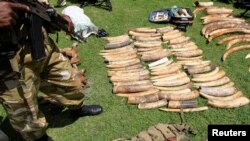A new report says there is growing evidence that the rebel Lord's Resistance Army (LRA) is involved in elephant poaching in central Africa.
The report, released Monday, says the LRA is using the illegal trade in elephant tusks as a way of sustaining itself.
The findings come from two U.S.-based groups, the Enough Project and the Satellite Sentinel Project, based on research at Garamba National Park in the Democratic Republic of Congo.
Enough Project spokesman Jonathan Hutson, who recently visited the park, said in an interview with VOA that a former LRA detainee was among those who described atrocities in the region.
"He has seen that LRA fighters were shooting elephants and cutting out the ivory tusks and that they were calling in him and others to strip the meat from the carcasses," Hutson said. "And, other LRA defectors report that from time to time, white helicopters will land in the park and trade ivory with the LRA fighters in exchange for guns, ammunition and food."
The LRA once battled the Ugandan government but now exists as bands of roving fighters in Congo, South Sudan and the Central African Republic.
The African rights groups say LRA involvement in poaching is especially troubling because of the violence associated with the rebel group. The group is known for looting villages, mutilating civilians and abducting children who are sometimes forced to fight as soldiers.
Hutson says the LRA is among a string of groups linked to the illegal trade of elephant ivory, which is in strong demand in some Asian countries.
"The LRA is not the only group benefiting from this surging black market for ivory. Park rangers suspect that members of Congolese, Sudanese, South Sudanese and Ugandan armed forces as well as state-sponsored militias from Sudan - those Janjaweed militias from Darfur, for example - are killing elephants at an accelerating pace," he said.
Last week, United Nations special representative Abou Moussa told the U.N. Security Council that increased poaching in central Africa is fueling insecurity in the region.
"The issue of poaching is another emerging and rapidly growing phenomenon that has the potential to impact negatively on an already challenging peace and security situation in some parts of the sub-region," he said.
At a March conference, the Economic Community of Central African States endorsed a $2.3 million initiative to combat poaching.
Hutson says as part of the effort, regional park rangers need better training and more surveillance equipment.





